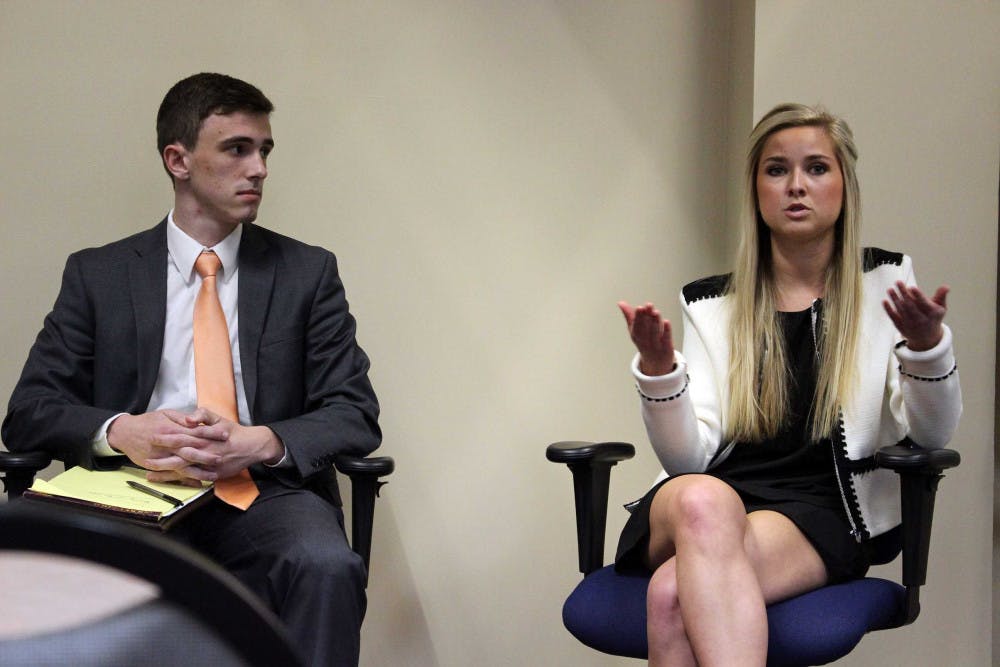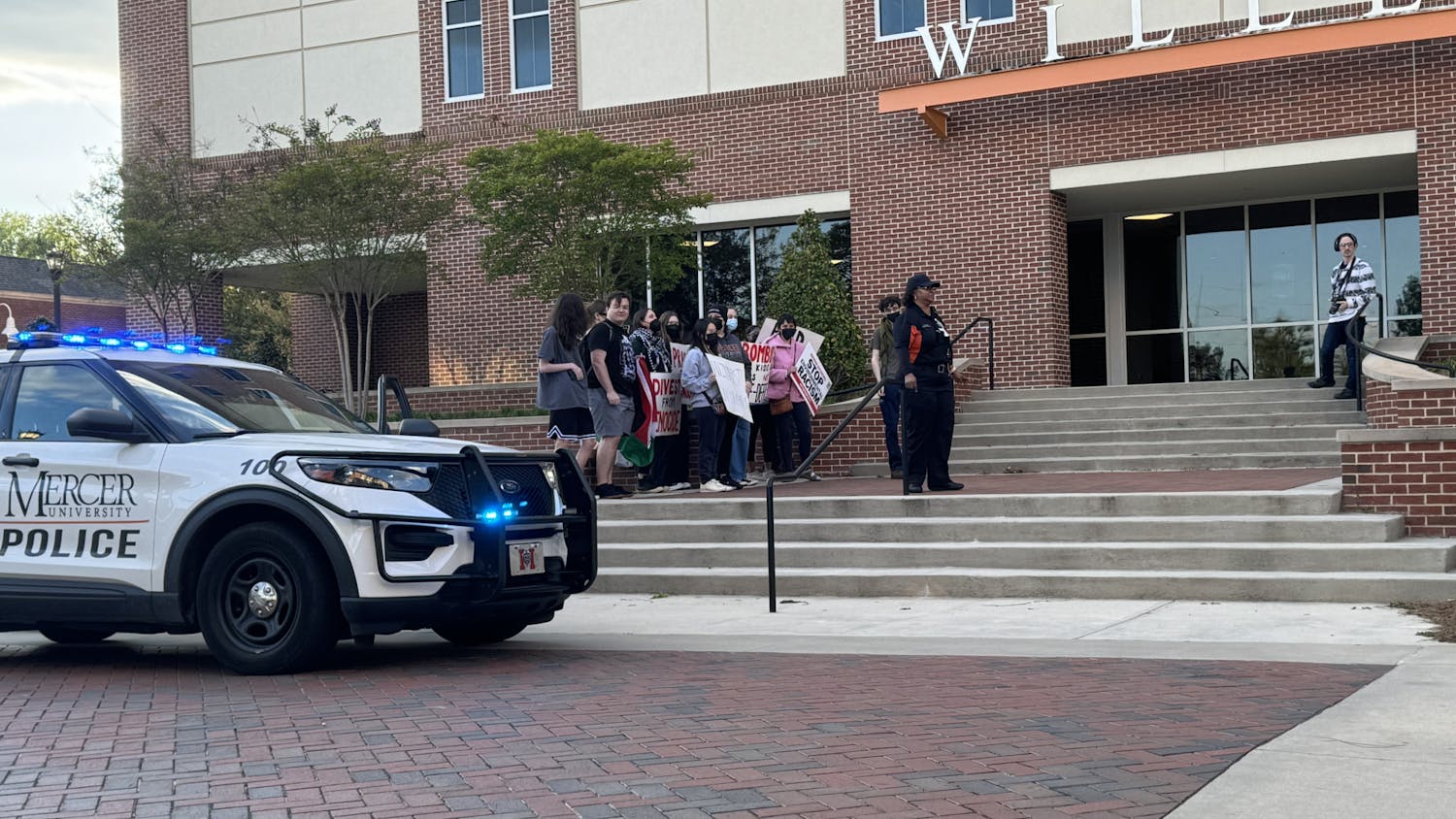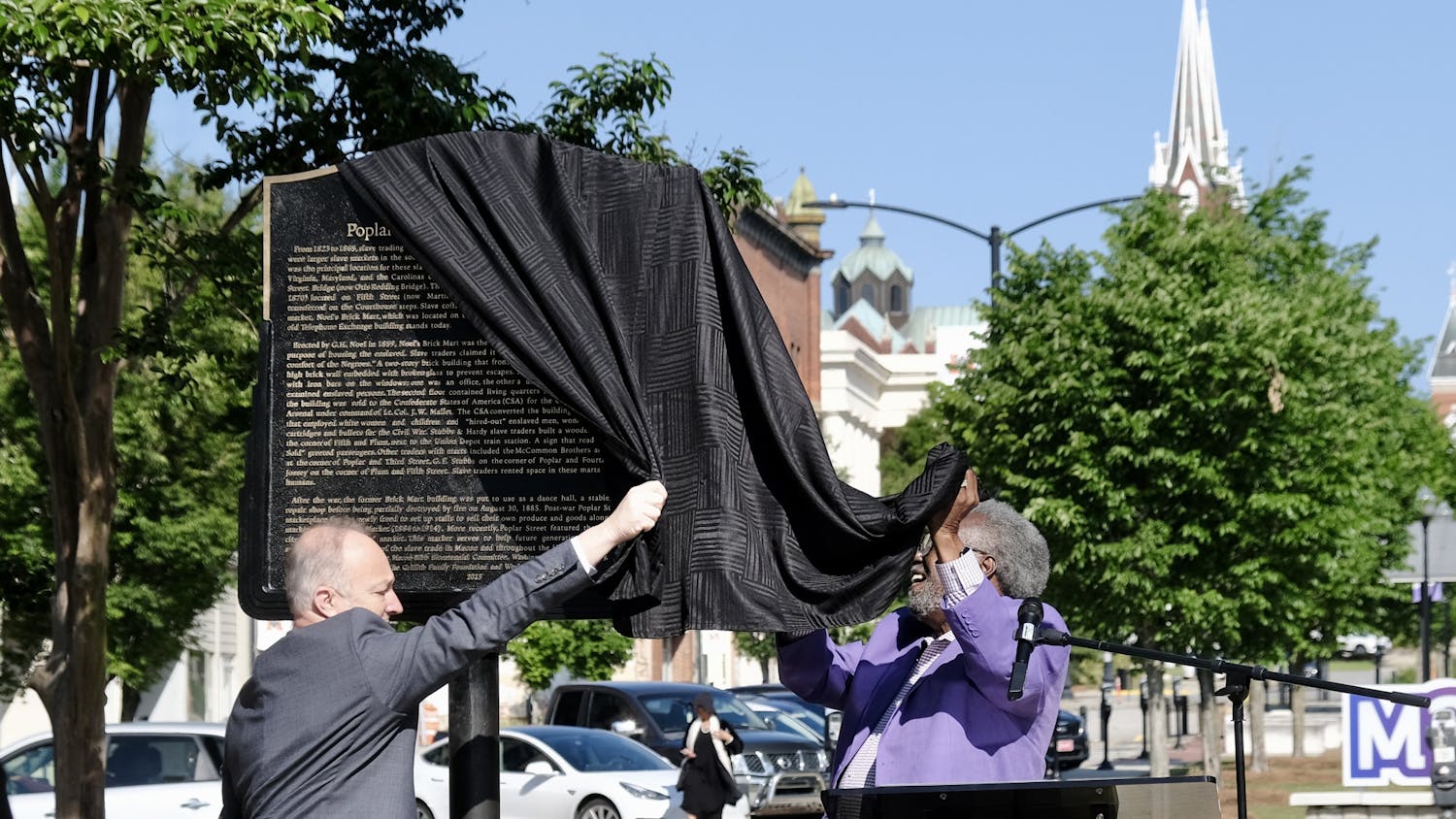The Student Government Association held its annual Presidential Debate at 7 p.m. on March 23.
This year’s debate featured three tickets for president and vice president: Alexandra Kirschbaum and Cole Porter; Catie Byrd and Michael Smith; and Olivia Buckner and Oge Onuh.
The debate began by allowing each ticket three minutes to make an opening statement from their platform.
[gallery ids="21287,21286,21285" orderby="rand"]
From the Opening Statements
With four years of SGA experience between them, Buckner/Onuh’s platform is being run based on “inclusivity, active communication and impactful initiations,” Onuh said.
Byrd/Smith are using the passion and experience they have gained from SGA to execute their goals if elected.
[related title="Related Stories" stories="21190,20766,19237" align="left" background="on" border="none" shadow="off"]
“[Our] experience sets us apart as candidates and will equip us as an administration to more effectively channel funding towards student organizations and mobilize senators to more actively support these student organizations,” Byrd said.
Porter/Kirschbaum, who as rising juniors are the youngest ticket on the ballot, have not let that be a hindrance in their experiences with SGA and what they are planning to do if elected.
As she talked about the many issues she has heard from students about wifi, parking and dining, Kirschbaum said that she and Porter are different from the rest of the candidates in how they will handle them.
“The approach we have is very unique and very innovative,” Kirschbaum said.
After opening statements, the debate went into a question and answer session from previously submitted questions. SGA provided a way for students to submit questions through an online question form said SGA Senator Jordan Price.
Out of the almost 80 questions received from the online question form, the SGA narrowed the questions down based on which ones showed the “most widespread support,” Price said.
The narrowed questions were split into sections based on topic. The first topic was on diversity.
Under the topic of diversity, a previously submitted question on the issue was if the candidates felt that “Mercer University is currently a welcoming and safe environment for minorities.” Price said.
From the candidate's Q&A
“Our administration is strictly focused on active communication and impactful initiatives. With that being said, we really want to work hard with our multicultural organizations and any organization that feels like their voice isn’t being heard,” Buckner said.
Buckner said they plan to do this by planning more events around the multicultural organizations of Mercer.
While the Buckner/Onuh ticket talked about how they planned to make Mercer a more welcoming environment for minorities, the Byrd/Smith ticket took a different approach to start their answer.
“To be quite frank,” Smith said, “I don’t know what it’s like to be a minority student on our campus. I’m not a part of any minority group as it stands in my person. Because of that, I’m not going to stand here and say Mercer is a safe campus. At the most of my knowledge, I know there’s room for improvement. The way that we can improve is by listening.”
While Byrd/Smith will focus on listening to the concerns of students, Porter/Kirschbaum will focus on implementing new committees and councils that will involve multicultural groups.
“[One is] going to be a subcommittee on SGA that’s going to be comprised of different campus leaders from different organizations.” Kirschbaum said.
The other is a multicultural council.
[video credit="Mercer University SGA Facebook Page" align="right"][/video]
“It would serve as a diversity headquarters. If there’s ever a need to look at any diversity issues, this multicultural council would be in charge of doing that,” Kirschbaum said.
The next question was directed specifically to the Byrd/Smith ticket. In their opening statement, Byrd said one of their goals, if elected, would to also implement a multicultural council. However, their idea for the council would be different than Porter/Kirschbaum.
“These [advisory councils] will be official roles on SGA for several people from every multicultural organization, every athletic team and every Greek organization,” Byrd said.
As the questions continued, the topics included specific needs of students, especially those who are disabled, prices of housing, workings of the Honor and Judicial Councils, support of campus organizations, dining issues, safety concerns, smoking/drinking concerns, making Mercer more environmentally friendly, the presence of Greek life in SGA, personal qualifications and the issue of personal beliefs.
One topic that the three tickets agreed on was the support of campus organizations included allocating more funding.
“One of the most efficient ways to provide support is to provide more funding,” Byrd said from her experience on SGA’s Fiscal Affairs committee.
Bucker/Onuh presented two methods of how they will support organizations that includes “help[ing] promote [them] by cross-programing and also help[ing] financially,” Onuh said.
Helping financially for Porter/Kirschbaum includes an immediate “10% increase in the amount of funding we give student organizations,” Porter said.
While the candidates looked at the budget to figure out how to allocate more funding to student organizations, Porter/Kirschbaum also looked to provide a $2,000 fund for a dining study.
The topic of the dining study, which has been a part of their campaign, was specifically questioned through the online form.
“Why would a $2,000 dining study be necessary when SGA could just listen to student concerns,” Price read.
Porter’s response to the question explained that he and Kirschbaum sat down with Auxiliary Services Director, Ken Boyer, to find an efficient way to do a dining study.
“What we decided to do was use $2,000 of SGA’s budget that’s currently not being used, so we optimize that from other areas that may not be going under use. It gives us money that we could use if we decide to,” Porter said.
While they are not certain if the $2,000 study will actually be conducted, Porter said they “would be able to have the funding and resources to make that happen for students.”
After the previously submitted questions ended, the floor was opened up to allow questions from the audience.
Live questions included more concerns about housing for students, funding for student organizations, what each of the candidates have done in service outside of their SGA titles, and what the candidate’s favorite thing about their running mate was.
After they each spoke on how they felt about their running mate and how their campaigns have been going so far, the candidates were given the opportunity to make a closing statement.
From their Closing Statements
“We have a plan to fix these problems [mentioned]. Some of those have been implemented, some of those will be implemented if we were elected,” Porter said. “We are passionate about these ideas so we tried to make a plan so you can have a tangible representation of what we would like to do if we were elected.”
Porter also mentioned something new in his opening statement that would be implemented if elected. Porter said that he has been working on a movement with other SGA members from around the state on issues like students’ voices in Georgia legislation.
If elected, Porter said he would make sure that Mercer would continue to be an impact in the organization of statewide SGA members.
Along with Porter/Kirschbuam, Buckner/Onuh closed by talking about their passion.
“Our passion and our focus and our drive to make SGA a better place for everyone, that’s what we want to see next year,” Buckner said.
Byrd/Smith wrapped up by reiterating their slogan, “Light the Bridge,” by reminding the audience that SGA is a bridge between students and the administration.
“The bridge has been dim, dull and dark the past couple of years,” Smith said. “Catie and I want to flip the switch. Catie and I want to light the bridge.”
After the end of the closing statements, Price thanked the audience for attending the debate and reminded them that official voting for the candidates would be March 28 and 29.
Price said the voting process would be online both days and that students would have the opportunity to vote on laptops in front of Stetson Hall on March 29.
As the audience dispersed, David Stokes, an audience member who was concerned about food expenditures under organization funding, said he thought the debate was well run.
“I think it was [a] very informative, very excellent opportunity to get to know each one personally a little bit and see how they want campus to run,” he said.





